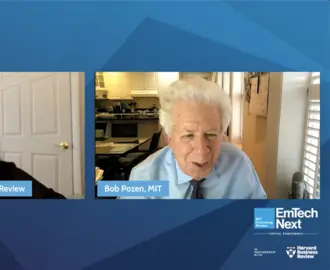We’ve all experienced this.
The highly anticipated software update that promised all sorts of new functionality for our phone or laptop has bugs in it, making the app worse or even unusable. This happened to me the other day. The only difference is it didn’t happen to my phone or laptop. It happened to my car.
Don’t get me wrong – the car drove perfectly safely, but the software update disabled my car’s navigation system and left a weird looking fuzzy square right in the middle of my dashboard. Ugh. A real inconvenience.
Lou Shipley, MIT Sloan Senior Lecturer, Technological Innovation, Entrepreneurship, and Strategic Management
Having spent my career in the software industry I know that what Tesla’s doing isn’t easy and I wasn’t at all surprised, when, a day later when Tesla downloaded a “patch” that not only fixed the software errors, but also included all sorts of cool new features in my car. So many in fact that I haven’t had time to review them all.
When a startup disrupts incumbent market leaders and changes the basis of competition in an industry, as the Tesla software car is doing in the auto manufacturing market, it’s the new problems they face and overcome that gives them the real advantage. It’s impossible for the traditional automakers to compete with Tesla because they haven’t experienced or learned what problems need to be solved with the software car?
Everything about the Tesla business model differs from the traditional automakers – software as the basis of the business; a relentless focus on improving battery technology; and equally important, how they market and sell their products. Meanwhile, the so-called industry leaders are bombarding consumers with endless, lame car ads promising financing deals for internal-combustion cars that pollute our environment. Thank goodness for “fast forward.”
I learned how utterly unprepared the incumbents are recently when I tried to purchase a Toyota truck online. When I went to their website, I was immediately shunted off to multiple dealers who, rather than take my order for the truck I wanted to buy, tried to sell me what they had in inventory. I had to deal with multiple dealers rather than one company. And the dealers wanted to sell me what they had in stock, what the auto makers had already manufactured rather than what I wanted to buy.
This is completely tone deaf in the age of online retail where we have all become accustomed to instant, customized purchasing.,
When you order a Tesla or Rivian, you go to a website and order what you want, not what some intermediary has in stock. Again, because Tesla and new rivals sell direct, they cut out the middleman. They can do this because maintaining and electric software car is so much less expensive than a traditional internal combustion vehicle.
Tesla isn’t just years ahead of the major auto manufacturers. They are lightyears ahead of them. It’s increasingly clear that the incumbents really don’t have any idea what it means to run a software company. They seem fixated on delivering an electric car with similar features to their current models. I think Tesla’s tougher competition will come from Rivian, Xpeng, Lucid and other startups that have started with a software-first approach to electric vehicles.
Why do I say that?
This week, Volvo announced that by 2030 it will only sell electric cars. 2030? That’s nine years from now and an eternity in the software business. Volvo’s “blockbuster” news followed GM’s recent breathless announcement that they will be moving to fully electric cars in a similar time frame. In Volvo’s press release the company mentioned that “we also need to listen to our consumers, and they expect transparency and a seamless experience getting and having a car.” Indeed.
Neither company mentioned the word software in their press releases. Rather their focus is solely on the electric car and have not thought through how fundamentally their business has been changed by the new entrants. As I have said previously, what sets Tesla so clearly apart from the incumbent automakers is not that they manufacture and sell electric cars. Yes, they do that and have a lead in battery technology. What gives them such a big first-mover advantage is they actually develop the software car. Tesla has a market capitalization eight times GM’s because Tesla is valued as a software company while GM and their fusty 100 plus year-old cohorts are not. They simply do not any longer understand the business they are in.
But get ready for more announcements from the traditional automakers that they will be all electric in a decade or so. By then the game will be long over and software companies will own the automobile market.
Lou Shipley is Senior Lecturer, Technological Innovation, Entrepreneurship, and Strategic Management at the MIT Sloan School of Management.



